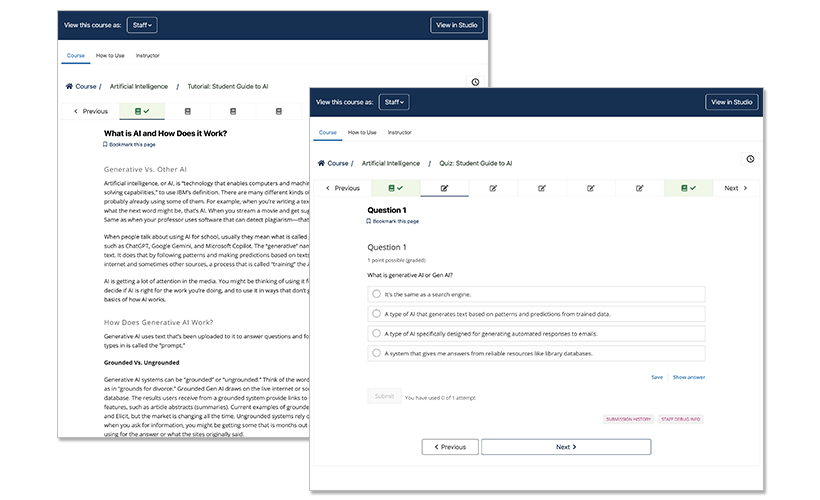Infobase customers are a varied group: students and patrons at academic, public, and school libraries; librarians at all those institutions; and teachers and other faculty. Listening to all those stakeholders is how we build products that meet your needs. And the need we’ve heard loud and clear lately is for information on artificial intelligence, or AI.
Research shows the same need but reveals a schism with regard to this new, equal parts exciting and scary tool. A 2023 survey by Tyton Partners, a knowledge-sector consulting firm, showed that only one-third of faculty report that they are teaching students how to use generative AI, and only a quarter use it themselves. However, 53% of these said that they would consider Gen AI usage if they knew better how to use it.
At the same time, an Inside Higher Ed survey shows that, when asked, “How much should your institutions be preparing you for the rise of artificial intelligence in the workplace?”, 27% of students surveyed said “a lot” and 45% said “somewhat.” Employers are even more emphatic about the importance of AI proficiency, with 75% saying that they see it as essential in employees.
So the situation is clear: students want to learn about AI, employers largely require them to use it, and faculty mostly aren’t teaching it but a slight majority say they would try the technology if they knew more about it.
At Infobase, we’re filling those gaps with new, librarian-created AI information in our courseware products. Information Literacy – Core (also known as InfoLit – Core) is a suite of videos and customizable tutorials and assessments that helps students understand foundational information literacy concepts. Our material offers students a solid grounding in finding, evaluating, and incorporating academic sources in their work as well as writing citations, thinking critically, understanding visual and quantitative data, and being good digital citizens. Information Literacy – Health Science (also known as InfoLit – Health Science) also addresses foundational IL knowledge using videos, tutorials, and quizzes, but caters to students in nursing and allied health courses. This resource covers topics such as evidence-based practice, medical databases, PICO questions, and health statistics and drug information.
The newest material in InfoLit – Core and InfoLit – Health Science is about artificial intelligence. In each suite of resources, there are two new tutorials and one new assessment:
- Tutorial: Student Guide to AI
- Quiz: Student Guide to AI
- Tutorial: Faculty Guide to AI

The tutorials cover:
- What generative AI is and how it works
- Related issues students and faculty should be aware of, such as plagiarism, copyright violations, bias, and AI errors or “hallucinations”
- Possible ethical uses for AI in academia
- Whether or not to use AI in school (for students) and whether or not to allow its use (for faculty)
- How to write AI prompts and how to teach students to do so
- How to cite AI and how to teach students to do so
 The works-cited list accompanying each tutorial shows the numerous articles, books, and videos on AI that we consulted in writing this new material. The lists can also be used as a further-reading resource for students and faculty who want more in-depth AI information.
The works-cited list accompanying each tutorial shows the numerous articles, books, and videos on AI that we consulted in writing this new material. The lists can also be used as a further-reading resource for students and faculty who want more in-depth AI information.
Throughout the material, we emphasize that students should check with their professors before using AI and should maintain academic integrity standards if they do use it (we also discuss how to do that). None of the material assumes any prior knowledge of AI. Instead, it covers enough detail so that students and faculty can try AI in an informed way. While the student and faculty tutorials cover the same topics, the faculty version is more extensive and also discusses how AI can be used to generate a research paper outline, which is permitted in some schools and not in others. The Health Science material offers the same information on AI, but the examples relate to health science rather than to general education topics.
Since InfoLit tutorials and quizzes can be customized, schools with different policies or vision with regard to AI can edit the tutorials and quiz to match their needs. They can also add their own material to the InfoLit platform. We hope that all of these possibilities allow our current and future customers to make students and faculty familiar and comfortable enough with AI to make informed decisions on its use in academic and professional work.
For more on our new material, please contact us here.
Subscribers, log in today to see the new tutorials and quiz.
Not a subscriber? Take a free trial of Information Literacy – Core and/or Information Literacy – Health Science today!
See also:
- Academic Integrity in the Age of AI
- Information Literacy Starts with Infobase
- Have You Had “The Talk”? Discussing AI with Students
- New Tutorials and More Added to Information Literacy – Core
- FREE case study: Bringing Creativity to Information Literacy: Show Students That “Research Is Everywhere”
[Hero image source: Nichcha/Shutterstock.com]


